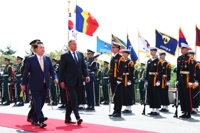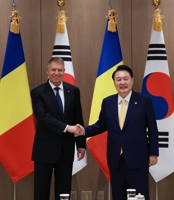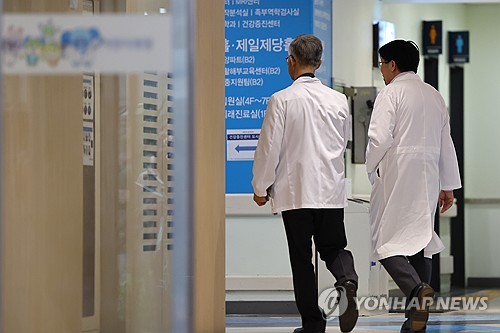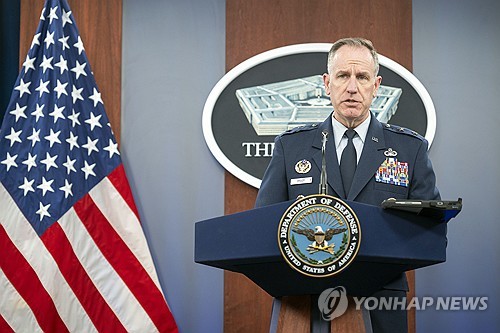(2nd LD) Sherman's remarks represent no change in U.S. position on historical tensions: State Department
(ATTN: UPDATES in paras 1, 8-10 with more State Department official comments)
By Chang Jae-soon
WASHINGTON, March 2 (Yonhap) -- The U.S. position on historical tensions in Northeast Asia remains unchanged that they should be dealt with in a way that "promotes healing and reconciliation," U.S. officials said Monday, after a top diplomat made remarks seen as taking sides with Japan in history rows.
Calling the situation in Northeast Asia "frustrating," Under Secretary of State Wendy Sherman said Friday that political leaders should not try to exploit nationalist feelings and "earn cheap applause by vilifying a former enemy."
The remarks were seen as referring to South Korea and China criticizing Japan for refusing to fully atone for its past wrongdoings, such as the country's enslavement of Korean and other Asian women as sex slaves for its troops during World War II.
South Korean lawmakers from both the ruling and opposition parties have expressed outrage, wondering how the U.S. could blame victims of Japan's militaristic past for the deadlocked situation when Tokyo keeps trying to whitewash and deny responsibility for its wartime past.
"Her remarks in no way reflect a change in U.S. policy," State Department deputy spokeswoman Marie Harf said at a regular briefing. "I think we were frankly a little surprised to see that some interpreted her remarks as being directed at any particular leader in the region. They were not."
Harf also said that Japan and South Korea are the most important U.S. allies in East Asia, and constructive relations between them are helpful to advance peace and prosperity in the region.
"Obviously our three countries share a lot in common. And in no way was she speaking about any one person or any one country," she said.
Harf did not elaborate, but a State Department spokesperson said later that the U.S. position is that historical issues should be dealt with "in a manner that promotes healing and reconciliation."
"We continue to emphasize the importance of approaching historical legacy issues in a manner that promotes healing and reconciliation," the spokesperson said. "As we have said many times, the apologies extended by previous Japanese Prime Minister Murayama and former Chief Cabinet Secretary Kono marked an important chapter in Japan improving relations with its neighbors."
The official was referring to the 1993 Kono statement and the 1995 Murayama statement in which Japan apologized for the sexual slavery issue and the 1910-45 colonial rule of the Korean Peninsula. The statements of apology have been considered the basis of South Korea's relations with Japan.
Meanwhile, Harf also denounced North Korea's latest missile launches.
"We've certainly seen those reports that they launched two short-range ballistic missiles into the East Sea," she said, using the Korean name for the body of water between South Korea and Japan.
"If confirmed, which I can't do independently, such missile launches would represent a threat to regional peace and security and would be a violation of multiple U.N. Security Council resolutions which have required North Korea to suspend all activities related to their ballistic missile program," she said.
Harf also urged the North to "do just the opposite, to take steps to lower tensions, to not raise them."
The North fired what appeared to be two Scud missiles into the East Sea on Monday in an apparent gesture of protest against joint military exercises that South Korea and the U.S. kicked off. The communist nation has routinely condemned such drills as a rehearsal for an invasion of the country.
jschang@yna.co.kr
(END)
-
 Overdue debut of Korean abstract art pioneer Yoo Young-kuk at Venice Biennale
Overdue debut of Korean abstract art pioneer Yoo Young-kuk at Venice Biennale -
 Relax, immerse yourself in scents at Venice Biennale's Korean Pavilion
Relax, immerse yourself in scents at Venice Biennale's Korean Pavilion -
 S. Korea marks 30th anniv. of Korean Pavilion at Venice Biennale with contemporary art
S. Korea marks 30th anniv. of Korean Pavilion at Venice Biennale with contemporary art -
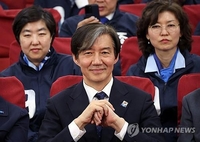 Ex-Justice Minister Cho slams Yoon's statement on crushing election defeat
Ex-Justice Minister Cho slams Yoon's statement on crushing election defeat -
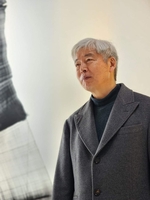 Artist Lee Bae captures ethereal Korean aesthetics at Venice Biennale
Artist Lee Bae captures ethereal Korean aesthetics at Venice Biennale
-
 Overdue debut of Korean abstract art pioneer Yoo Young-kuk at Venice Biennale
Overdue debut of Korean abstract art pioneer Yoo Young-kuk at Venice Biennale -
 Relax, immerse yourself in scents at Venice Biennale's Korean Pavilion
Relax, immerse yourself in scents at Venice Biennale's Korean Pavilion -
 Artist Lee Bae captures ethereal Korean aesthetics at Venice Biennale
Artist Lee Bae captures ethereal Korean aesthetics at Venice Biennale -
 S. Korea marks 30th anniv. of Korean Pavilion at Venice Biennale with contemporary art
S. Korea marks 30th anniv. of Korean Pavilion at Venice Biennale with contemporary art -
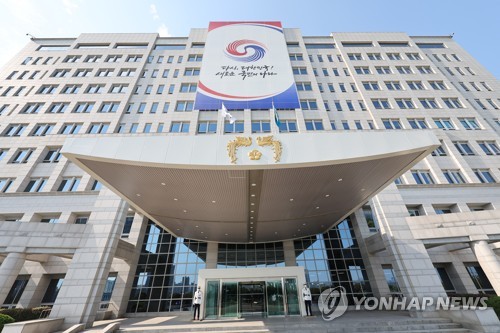 (LEAD) Presidential office denies Moon aides under consideration for PM, chief of staff
(LEAD) Presidential office denies Moon aides under consideration for PM, chief of staff
-
 Hybe says spinoff attempt by subsidiary label revealed clearly
Hybe says spinoff attempt by subsidiary label revealed clearly -
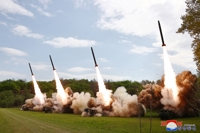 (LEAD) N. Korea says Kim guided simulated nuclear counterattack drill
(LEAD) N. Korea says Kim guided simulated nuclear counterattack drill -
 Hybe launches audit into NewJeans' label ADOR over alleged independence move
Hybe launches audit into NewJeans' label ADOR over alleged independence move -
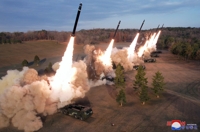 N. Korea says Kim guided simulated nuclear counterattack drills for 1st time
N. Korea says Kim guided simulated nuclear counterattack drills for 1st time -
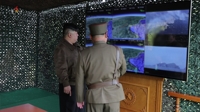 S. Korea warns N. Korea will face end of regime if it uses nuclear weapons
S. Korea warns N. Korea will face end of regime if it uses nuclear weapons















